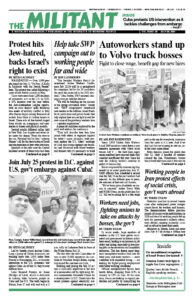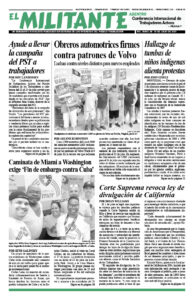
“What the imperialists cannot forgive,” Fidel Castro told the Cuban people at a rally in Havana April 16, 1961, on the eve of Washington’s attempted Bay of Pigs invasion, was “that we have made a socialist revolution right under their noses, under the nose of the United States itself.” He was describing what Cuban workers and farmers had accomplished in making and consolidating their revolution under the Marxist leadership of the July 26 Movement.
Castro, Che Guevara and the other leaders of the July 26 Movement led working people to make deeper and deeper inroads against capitalist exploitation and property relations, alongside steps to overcome racial discrimination and the oppression of women.
The revolution deepened as workers “intervened” and backed government takeovers of imperialist and native capitalist holdings; the nationalizing of the land enabled peasants to take over plots to farm; the mass literacy drive transformed both the students — whatever their age — and the teachers; and the popular militias and revolutionary armed forces defeated the U.S.-organized mercenaries at Playa Girón.
Cuba’s working people transformed themselves as they recognized the socialist character of their accomplishments and the Marxist character of their leadership. Through these mass proletarian mobilizations, they carried through the first — and so far the only — socialist revolution in the Americas.
Castro’s defiant statement in April 1961 simply described what the working people of Cuba had accomplished. But Blas Roca, general secretary of the Popular Socialist Party, the longstanding Stalinist party there, had fought for a different course.
Roca says revolution is not socialist
Roca explained in a report to the party’s August 1960 National Assembly that the Cuban Revolution was not — and should not be — socialist. An article based on that report was featured in the October 1960 issue of Political Affairs, the magazine of the Communist Party USA.
Roca claimed the Cuban Revolution could only be “anti-imperialist and anti-feudal,” that is, “bourgeois democratic,” and that the class forces carrying it out were “the workers, the peasants, the urban middle classes, and the national bourgeoisie.” The Popular Socialist Party and other Stalinist parties, from China to Spain, had long argued that socialist revolution was impossible in backward countries. They subordinated revolutionary struggle to the needs of the counterrevolutionary Stalinist rulers in Moscow, who sought “peaceful coexistence” with Washington.
Roca said communism “viewed from the correct angle constitutes a body of principles and practice of a universal character.” Universal principles that the Cuban Revolution “is not applying.”
In making that statement Roca, perhaps unwittingly, echoed what Karl Heinzen, a German petty-bourgeois socialist, had argued in 1847. Karl Marx and Frederick Engels explicitly rejected Heinzen’s view that communism was merely a “doctrine.”
“Herr Heinzen is very much mistaken,” Engels wrote. “Communism is not a doctrine but a movement; it proceeds not from principles but from facts.”
This central concept lay at the very heart of the Communist Manifesto. which Marx and Engels completed after the founding congress of the Communist League in London that year, the world’s first modern revolutionary workers organization.
“The theoretical conclusions of the communists are in no way based on ideas or principles that have been invented, or discovered, by this or that would-be universal reformer,” they wrote. They express “actual relations springing from an existing class struggle, from a historical movement going on under our very eyes.”
Guevara explains Cuba’s revolution
Che Guevara explicitly answered Blas Roca. In Cuba and the Coming American Revolution, Jack Barnes, today national secretary of the Socialist Workers Party, describes how he went to Cuba in mid-1960 to learn from and help advance the revolution. He and other young people from the U.S. and elsewhere in the Americas spent “many long hours there debating among ourselves the political and theoretical issues” posed by the “onrushing struggle we were part of and thinking through the questions addressed by Che Guevara” at the First Latin American Youth Congress in Havana July 28.
Guevara raised the question at the center of the debate: “Is this revolution communist?” In passing, he rejected the lies and distortions spread by Washington and red-baiting by the bourgeois-minded right wing of the forces that had joined in opposing Cuban dictator Fulgencio Batista.
To applause Guevara explained, “If this revolution is Marxist — and listen well that I say ‘Marxist’ — it is because it discovered, by its own methods, the road pointed out by Marx.” He added, “The Cuban Revolution was moving forward, not worrying about labels, not checking what others said about it, but constantly scrutinizing what the Cuban people wanted of it.”
The Socialist Workers Party championed the revolutionary course advanced by Che and Fidel Castro, said SWP leader Mary-Alice Waters in a Chicago forum April 24. “We were part of this debate, defending the Cuban Revolution and what it was accomplishing.”
The task of communists is to raise the working class up to become the leading class through the conquest of political power. That is precisely what the revolutionary cadres within the Rebel Army and July 26 Movement, with Marxist leadership, achieved.
The Cuban Revolution helped renew the prospects of socialist revolution, proletarian internationalism, and Marxist revolutionary working-class leadership worldwide. It inspired a new generation of revolutionaries who dedicated their lives to emulating its example.
When Barnes asked revolutionary fighters in Cuba whether he should stay in Cuba and fight alongside them or return to the U.S., they told him to go back and join whatever party he found that was preparing to do what they did in Cuba. Barnes came back and joined the Socialist Workers Party to help lead in fighting for the working class to take political power and carry through a socialist revolution here.

